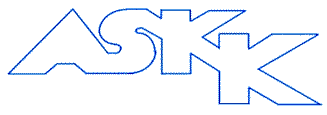

ELECTRONIC DATAINTERCHANGE MODULE
I
nherent in the operations of transportation brokers and carriers, is the daily entry of extensive information pertaining to the movement of loads, allocation of funds, and so on. Frequently, information is passed from person to person, printed, mailed, processed, and reprocessed, tying up valuable human resources, and creating bottlenecks where human resources are not available.W
e at ASKK are aware of the excessive flow of information required to make a business operate, and have responded by incorporating the Electronic Data Interchange (EDI) module into the TEDS system. Designed specifically to accommodate the transfer of information from one source to another, EDI allows computers to communicate with each other via an EDI network, greatly reducing the burden on human resources. For example an A/R invoice can be transmitted, received, and paid for by a customer without ever having to pass paper to the customer. Furthermore, an EDI transmitted invoice is loaded directly into your customer’s computer right away, allowing for greater expediency in the payment of that invoice.E
lectronic Data Interchanges are based on a world wide standardized network. Data transmissions are directed from your office to a local EDI network base. There, the data is analyzed to ensure that 100 percent integrity is maintained through the transmission. The data is then placed into the receiver’s "mailbox", along with a transmission code which identifies the kind of transmission taking place, and how that data should be allocated. Three particular kinds of EDI’s are prominent in the transportation industry.T
he first of these is a TDCC 210, which enables users to send accounts receivable invoices out to their clients without a Bill of Lading document. The second is called a TDCC 214, and is used to transmit various status messages like "Load has been delivered". This form of transmission is excellent for maintaining quick and effective communications between you and your customers. The third transmission is called a TDCC 204 message. Designed to place orders to carriers with all necessary load information intact, a 204 effectively eliminates the need for lengthy, or complicated telephone communications.
|
©2025 Technologies Inc. |